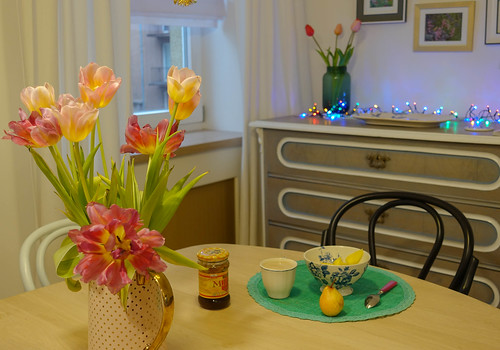
The apartment is clean and ready for my return, even as I know that my travels here will be minimal this year -- or at least very very short, short even than this mini-stay in Warsaw.
Small suitcase packed (travel light and you can get packing down to less than five minutes), trash taken downstairs, radiators turned down, shades lowered. I'm getting to know this routine well.
There are many reasons to stop in Paris on my way back and the one that comes to mind today is that I do not have to catch the horribly early 6 a.m. flight out of Warsaw (a necessity if you want to cross the Atlantic in the same day). I'm not exactly rested, as bedtime was awfully late, but still, it's no longer dark outside when I set out to my bus stop.
Again -- familiar routes! Past the university (the building to the left once housed the economics department where I studied)...
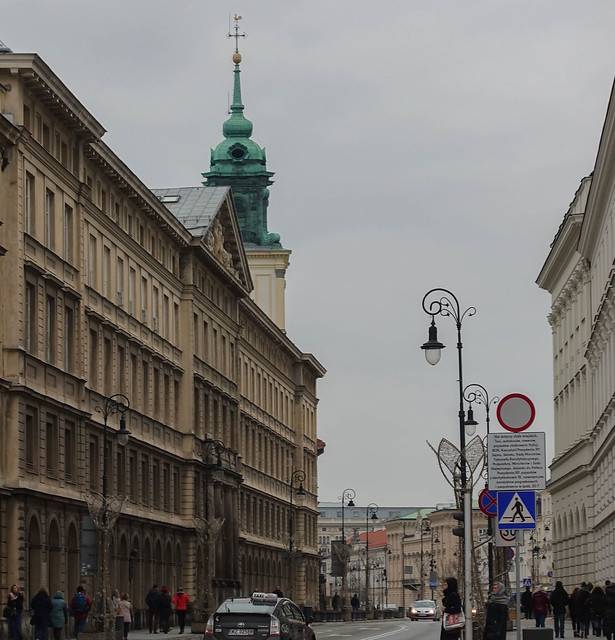
And you certainly recognize this next street. I join the people waiting for the bus.
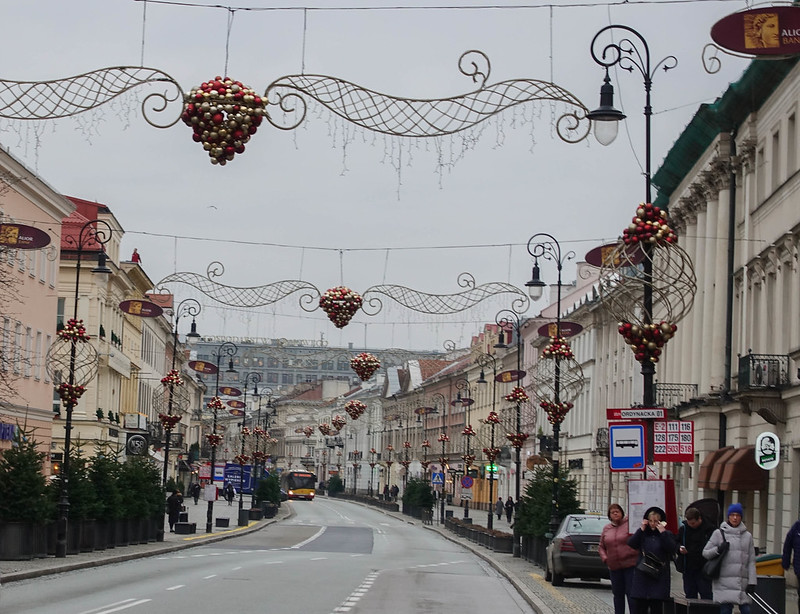
Most everyone in Warsaw uses public transportation to get around. Commuting to work, or just attending to life's tasks. Young (very young!) and old (very old...).
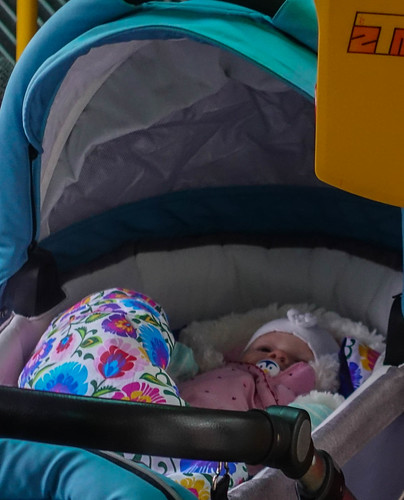
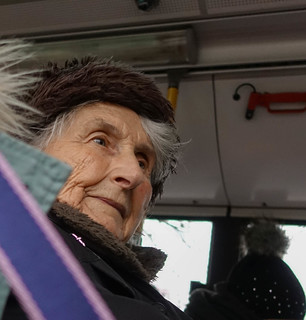
As we pass the Palace of Culture, I remember that it had come up in last night's discussion: Warsaw has had a flurry of street name changes lately and sometimes the decision to rename a street comes significantly before the sign is replaced with the new name, so that if you google an address using an old name (you might not even know that the name has changed), you'll be automatically directed to the new street, but if you walk there, you'll still have the old placards.
As so many things in life that repeat themselves in one way or another over time and over cultures, the street name change prompts similar questions as the removal of monuments has prompted in the U.S. It seems to me that in Warsaw, the decision to erase ties to an unpopular past has been rather extreme. A poet who reflected sympathetically about communism will be replaced by one who did not. You can take this to the next level (and many in Poland wish to do so) and ask: should the Palace of Culture be torn down, as it was built as a gift from Stalin? Yes? Well what if instead, he had built the subway system in the city (as some say was then under contemplation)? Many people in the west have watched the (sometimes rather violent) removal of monuments to unpopular now leaders in the former Eastern Bloc, but the Palace of Culture has never been regarded as a monument. It is a rather splendid (at least on the inside) building with many public spaces and architecturally interesting elements to it. Moreover, the tall buildings that sprung up around it since Poland's entry into market capitalism are arguably even less attractive than the Palace itself. They were built with haste, pride, and without much attention to the integrity of the city skyline.
For now, I notice a form of real progress (in my mind)! A sign on this bus stop tells people that smoking at bus stops is prohibited!
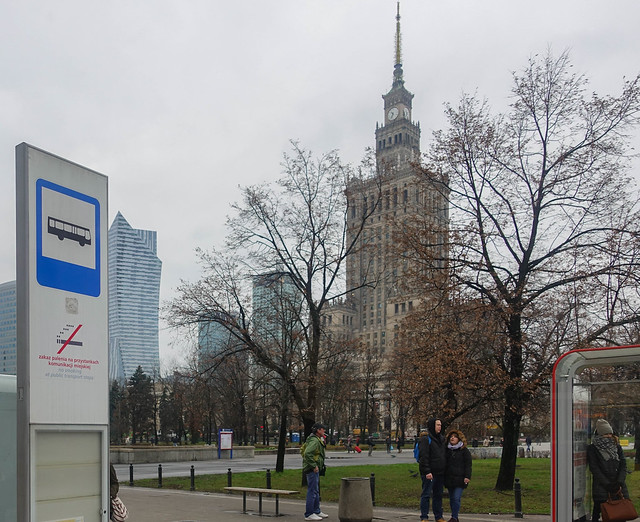
I catch my flight to Paris and in a few hours I am there.
It's warmer in France than it is Poland. My winter jacket suddenly feels very unnecessary. Still, it is drizzling. I have yet to see the sun in Europe (except in flight). A little rain, then a pause. A little rain, then a pause. Half the people keep umbrellas out, half don't bother.
Paris, just after a rain is quite lovely. The wet sidewalks reflect the street lights.
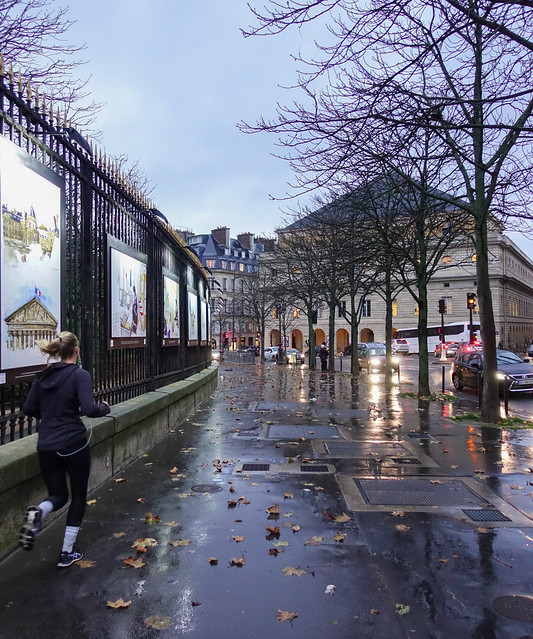
The cafe tables collect puddles and droplets...
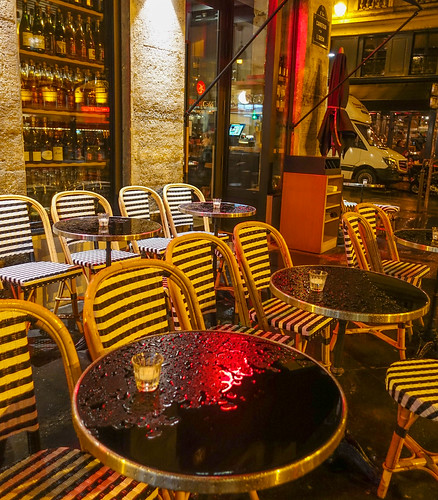
It's all just lovely.
I don't have far to walk from the airport train. My old hotel Baume. Same old. The little place on the Left Bank, steps from the Luxembourg Gardens.
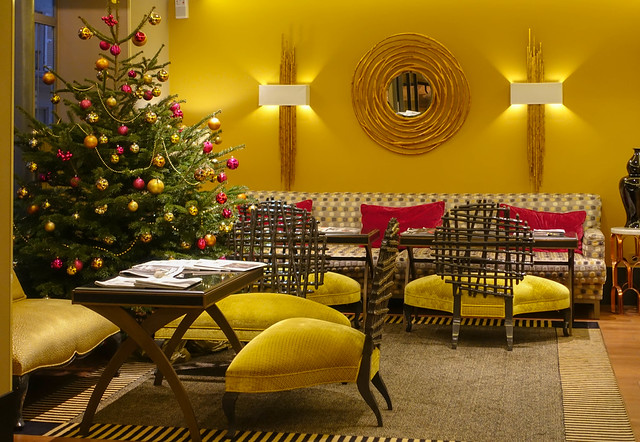
The staff there used to have that polite indifference to even the most loyal guests (me, for example), but in recent years they've completely flipped. They are warm, friendly and best of all, in the Christmas season, they give me a free upgrade to their best room.
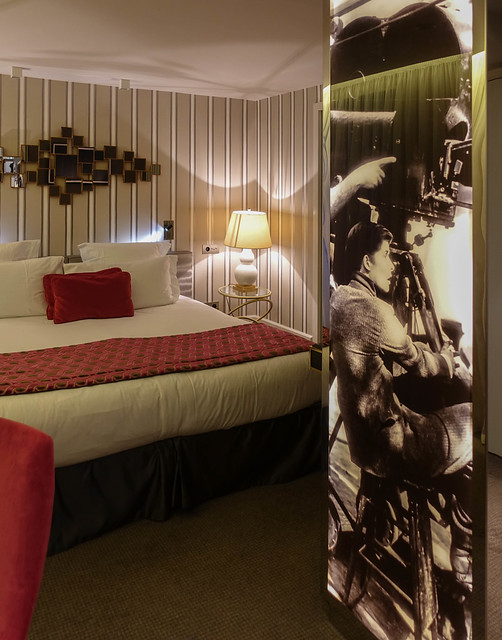
It's late. Stores are closing. But unlike Poland, where the magic switch has not yet been flipped on city Christmas lights (silly people haven't quite realized that early lights and early shopping go hand in hand; you don't fully get how to stoke the benefits of capitalism when you're fresh to it), In Paris the lights are ablaze!
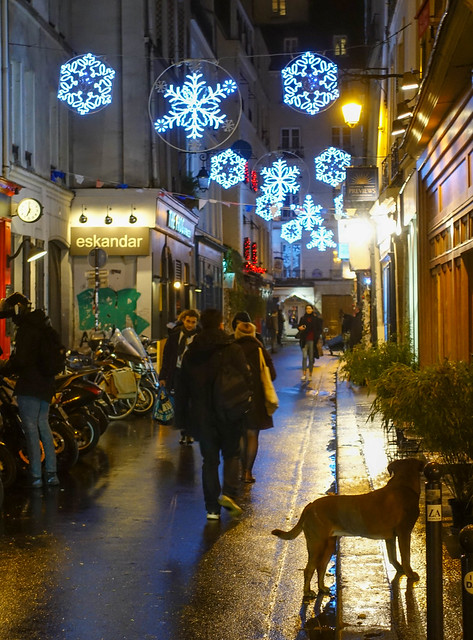
(And the people are eating and drinking, inside, outside, oh, you know -- it's Paris. This is what they do here.)
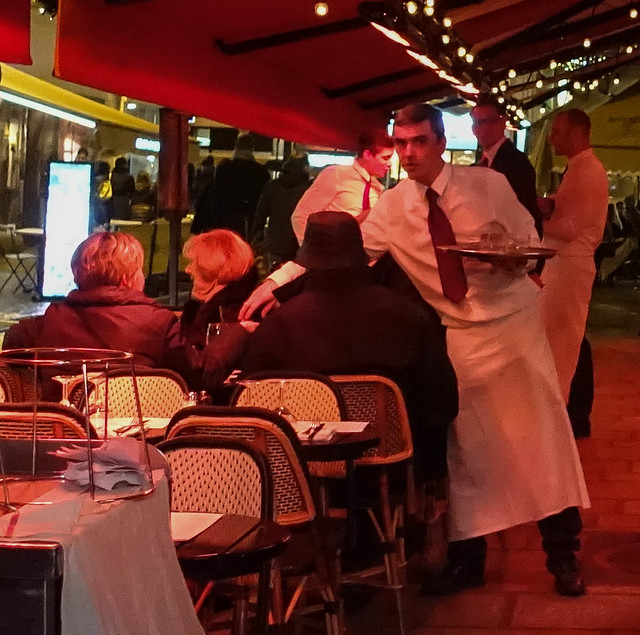
I shop a little. I do. I'm a grandma, no?
And then I sit down to eat at the Breizh Cafe -- my new go-to place here. It's a restaurant born in Brittany, specializing in savory buckwheat crepes, though not only. It's beloved by all and it's hard to get a table, even in the dead of winter, but I have found that just stopping by and chatting amicably with the seating guy may carve you out a spot after all.
Eating alone in Paris makes some people anxious. There are very few tables (if any) set just for one. You look so... well, alone.
Bet tell me: does this selfie look like it's photographing a scared and/or lonely person? (I have a jug of cider, I have a book, I have my iPhone.)
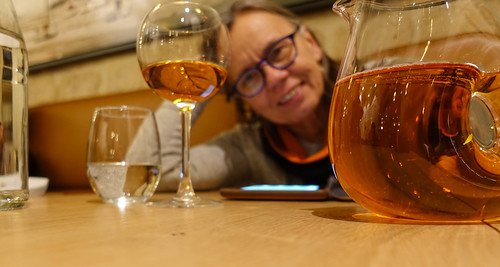
Still, I have come from filling my days with family and especially Snowdrop, to filling my days with my sister and Warsaw friends, to being by myself. It's a jarring change.
Time to pick up the mystery story I've been meaning to finish for so long and more importantly -- time to catch up on sleep. Not exactly what you'd expect to hear from a person who has just arrived in Paris, but indeed, this is my Parisian moment: in a comfortable bed, hearing the muffled street sounds outside, munching on candies brought over from Warsaw, reading a book.


I’ve never known anyone who packs a set of days like you do. I have enjoyed another interesting set of photos from this whirlwind trip!
ReplyDeleteLove the rainy Paris street scenes and love the composition of that selfie.
What is the mystery you’re reading? I like a mystery - it’s not easy to find a literate mystery.
So please share!
Did I recommend to you Dinner at the Center of the Earth? Israel-Palestine is the setting, with side trips through time and place, and it’s helpful to be familiar with the long and heartbreaking history of the region. But this book, though also heartbreaking, how could it not be, is always a wild ride, fast paced and changing, challenging the reader to keep track of and figure out characters, connections, motivations. Don’t read the NYT review first. You might read things you’d rather figure out yourself.
Thanks for the book tip!
DeleteAs for mine -- well, I don't know if it would meet your needs. I'll describe it and let you decide: it's a whole series of Inspector Bruno books (i'm on book four or five having started this summer) written by Martin Walker. They take place in France and I think Walker does a superb job of conveying the culture of small town France. Just superb. Walker is an Oxford grad and a former reporter for the Guardian, commentator for CNN and NPR and editor for the UPI. So he's a good writer. His books have well researched historical backdrops. And they link the common and the mundane (who knocked out the fence and this killed the farmer's ducks in the Perigord?) with important and difficult problems of ecological activism, immigration and nationalism, etc. Having said that, I think the series is appreciated most by those (me!) who love good writing with a soft brush. Bruno, the main character is a guy who cooks fabulously, loves his pooch to pieces, but cannot come to an agreement with the love of his life as to how to combine professional aspiration with a meaningful relationship. I mean, that's a minor angle to the books, but it's there and I like it!